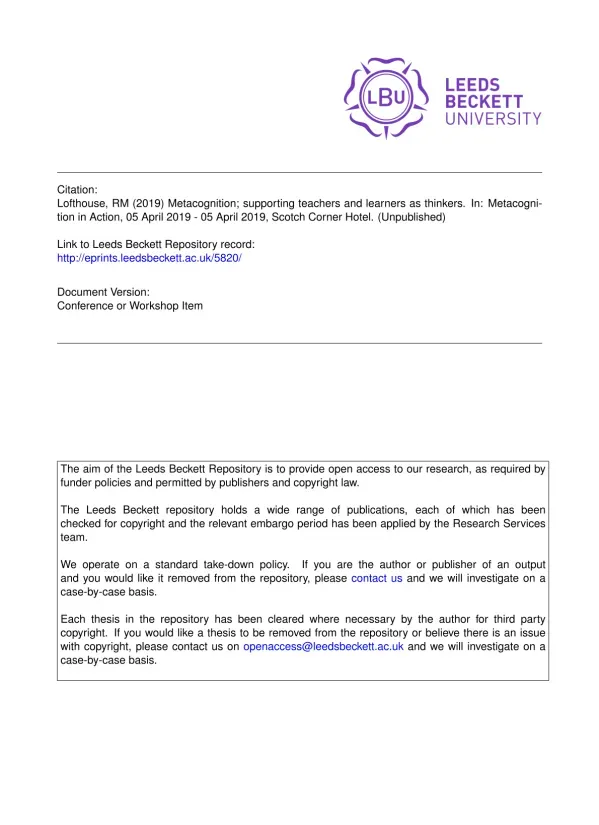
Supporting Teachers and Learners in Metacognitive Practices
Document information
| Author | Rachel Lofthouse |
| instructor | Professor Rachel Lofthouse |
| School | Leeds Beckett University |
| Year of publication | 2019 |
| Place | Scotch Corner |
| Document type | conference or workshop item |
| Language | English |
| Number of pages | 30 |
| Format | |
| Size | 2.01 MB |
- Metacognition
- Teaching Strategies
- Learning Processes
Summary
I. Introduction to Metacognition
Metacognition is a critical component in the educational landscape. It refers to the awareness and understanding of one's own thought processes. Supporting teachers and learners in metacognitive practices enhances the learning experience. The reciprocal relationship between thinking and learning is emphasized. As stated, 'Thinking is the basis for learning, and learning allows for better thinking.' This highlights the importance of fostering an environment where both teachers and students engage in reflective practices. The document outlines how metacognitive strategies can be integrated into teaching methodologies. By doing so, educators can facilitate deeper learning and promote critical thinking skills among students. The significance of metacognition lies in its ability to empower learners to take control of their own learning journey. This empowerment leads to improved academic outcomes and personal growth.
II. Pedagogical Strategies for Metacognition
Effective pedagogical strategies are essential for implementing metacognitive practices in the classroom. The document identifies several powerful strategies that can be employed. These include collaborative learning, explicit instruction, and reflective questioning. Powerful pedagogic strategies encourage active participation and engagement from students. For instance, group work allows learners to share their thought processes and reflect on their learning. The document emphasizes that teaching thinking skills requires both teachers and students to focus on cognitive processes. This approach not only enhances understanding but also fosters a culture of inquiry. As noted, 'Teaching thinking skills involves both the teacher and pupils paying attention to the cognitive processes that facilitate learning.' Such strategies are adaptable across various subjects and educational contexts, making them valuable tools for educators.
III. The Role of Self Regulation in Learning
Self-regulation is a key aspect of metacognitive practices. It involves learners managing their own motivation and learning strategies. The document discusses how self-regulation can significantly impact academic performance. Meta-cognition and self-regulation approaches aim to help learners think about their own learning explicitly. By teaching specific strategies, educators can guide students in setting goals and monitoring their progress. The evidence presented indicates that these approaches lead to an average of eight months' additional progress for students. Collaborative learning environments enhance the effectiveness of self-regulation strategies. Learners can support each other, making their thinking processes explicit through discussion. The metaphor of 'scaffolding' is introduced, illustrating how teachers can provide initial support and gradually encourage autonomy in learners.
IV. Practical Applications and Real World Impact
The practical applications of metacognitive practices are vast and impactful. The document outlines various interventions and pedagogies that can be implemented in educational settings. Learners as thinkers is a central theme, emphasizing the importance of fostering independent thought. Strategies such as 'Odd One Out' and 'Living Graphs' are introduced as engaging methods to challenge students' thinking. These activities encourage critical analysis and problem-solving skills. The document also highlights the importance of contextualized coaching for teachers. By modeling effective practices, educators can enhance their own skills and improve student outcomes. The feedback from participants indicates that ongoing support is crucial for successful implementation. As one lead teacher noted, 'The difference between this project and anything else we’ve done in the past, is the support.' This underscores the value of collaborative professional development in fostering a culture of metacognition.
Document reference
- Metacognition; supporting teachers and learners as thinkers (Rachel Lofthouse)
- Education: What is it for? (Gert Biesta)
- Powerful Pedagogic Strategies (Steve Higgins)
- Powerful Pedagogic Strategies (David Leat)
- Teacher learning takes place at the connection between theory, practice and person (Korthagen)
